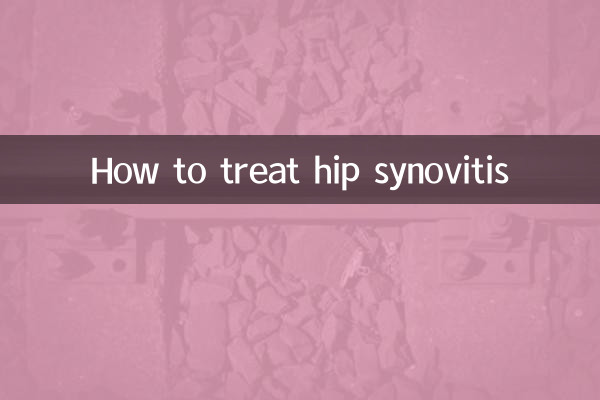How to treat hip synovitis
Hip synovitis has become one of the hot topics in the health field recently, with many patients seeking treatment due to pain and limited mobility. This article will combine the hot content of the entire Internet in the past 10 days to introduce you to the treatment methods of hip synovitis in detail and provide structured data for reference.
1. What is hip synovitis?

Hip synovitis refers to pain and dysfunction caused by an inflammatory reaction in the synovial membrane of the hip joint. It is common in patients with sports injuries, overexertion, or arthritis. The main symptoms include hip pain, swelling, and limited activity.
2. Treatment methods for hip synovitis
Based on recent discussions between medical experts and patients, treatments for hip synovitis can be divided into the following categories:
| Treatment | Specific measures | Applicable people |
|---|---|---|
| drug treatment | NSAIDs (such as ibuprofen), topical ointments | Patients with mild to moderate pain |
| physical therapy | Hot compress, cold compress, ultrasound treatment | Patients with acute and chronic inflammation |
| Rehabilitation training | Low-intensity stretching, hip stability exercises | convalescent patients |
| surgical treatment | Arthroscopic debridement, synovectomy | Severe cases or those who fail conservative treatment |
3. Recent hot treatment trends
1.Traditional Chinese Medicine Physiotherapy: Recently, many patients have tried traditional Chinese medicine methods such as acupuncture and massage, and reported remarkable results.
2.stem cell therapy: As an emerging treatment method, stem cell injection to repair synovial damage has become a hot topic.
3.Home rehabilitation equipment: E-commerce platform data shows that sales of hip joint rehabilitation equipment have increased by 35% in the past 10 days.
4. Prevention and care suggestions
| Precautions | Specific methods |
|---|---|
| control weight | Maintain a BMI between 18.5-24 |
| moderate exercise | Avoid strenuous jumping exercises and swimming is recommended |
| Nutritional supplements | Increase collagen and vitamin C intake |
| posture correction | Avoid sitting for long periods of time and be active for 5 minutes every hour |
5. Answers to Frequently Asked Questions by Patients
1.Q: Can hip synovitis heal on its own?
A: Mild synovitis may heal on its own, but timely treatment is recommended to avoid worsening.
2.Q: How long does the treatment cycle take?
A: It usually takes 2-4 weeks to see results, and full recovery takes 3-6 months.
3.Q: What exercises should be avoided?
A: Impact sports such as running, climbing, and squats should be suspended.
6. Expert advice
Professor Wang, Director of the Department of Orthopedics at Peking Union Medical College Hospital, recently pointed out: "The treatment of hip synovitis should follow the three-stage principle of 'rest-anti-inflammation-recovery', and early intervention is the key. At the same time, it should be noted that about 30% of cases will relapse, so prevention is more important than treatment."
Dr. Li from the Rehabilitation Department of Shanghai Ruijin Hospital added: "We found that the recovery time of patients who cooperated with pulsed electromagnetic field treatment was shortened by 20% on average."
7. Summary
Although hip synovitis is common, it cannot be ignored. Timely and correct treatment is crucial. It is recommended that patients choose a suitable plan based on their own circumstances and consult a professional physician when necessary. Maintaining good living habits is the fundamental way to prevent recurrence.

check the details

check the details